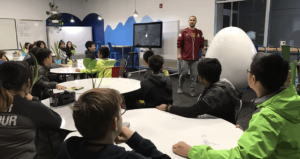HigherEd Innovation: Reengineer or Replace?
The spiraling cost of college is unsupportable and unsustainable. It threatens America’s most important intellectual property—the world’s best universities. But most US universities coast on the reputation of the top four dozen and spiraling cost reduces their return on investment—for families and society.
As a solution, Rick Hess featured a Vance Fried paper Opportunities for Efficiency and Innovation: A Primer on How to Cut College Costs which suggests a college focused on learning would cost an undergrad about $6700 annually. The Oklahoma State prof suggested sensible reengineer recommendations: eliminate or separately fund research and public service, optimize class size, eliminate or consolidate low-enrollment programs, eliminate administrator bloat, and downsize extracurricular student activity programs.
But that’s still a $27k degree. Is there an alternative to college. Dale Stephens outlines why some young people should skip college in Your Guide to Academic Deviance. Innovative Educator Lisa Nielsen introduced us, “Dale is a Thiel Fellow and the leader of the social movement UnCollege.org. To disrupt education he is helping build RadMatter, a platform to revolutionize how people and companies develop and demonstrate talent. Over two years of ethnographic research, the team has identified ~20 talents (things on the macro level like seeing possibilities, empowering others, solving puzzles) to enable people to codify their lifewide learning experiences to better represent their talent to future employers.”
Dale’s advice is not for the “Dude, college was so boring” crowd, it recommends an aggressive course of directed personal learning and development. Peer-to-peer learning sites like P2PU.org are supporting informal learning and going a step further to develop new learning certification systems. A web developer, for example, would present a portfolio of work and list of recommendations to earn a certificate.
As I wrote in December P2P is the other higher ed. MBA programs are now competing with Fred Wilson’s blog (but most haven’t figured that out). What if there was an MBA test you could take like the bar exam for attorneys or the CPA exam for accountants? If we separate certification from learning, we’re likely to see spurt of innovation with new pathways to mastery.
Western Governor’s University was an early innovator in learning certification at the course level. Students can test out of subjects they know and accelerate their learning online. As a result, students typically finish in half the time. WGU is aligned with the spirit of Fried’s reengineering recommendations.
What if you could learn on the job and on peer-to-peer sites and demonstrate your expertise at regular intervals and earn a badge or certificate? Edexcel is the leading provider of learning qualifications—a series of professional certifications recognized in Commonwealth countries. Expansion of formal (i.e., government recognized) certification like Edexcel in the UK and informal certification programs like P2PU should result in more innovative learning pathways—both formal and informal.
Higher ed is increasingly competing against free anytime anywhere learning. More smart savvy learners like Dale will join the unschool movement and will create better cheaper ways to learn.
For more:
- Riots or Innovation
- WGU Growing by 30%
- The World Changed, Some Colleges Missed it
- Colleges Losing Their ROI
- Competency v Cohort
- merit badges







0 Comments
Leave a Comment
Your email address will not be published. All fields are required.